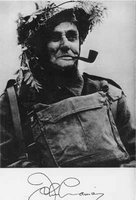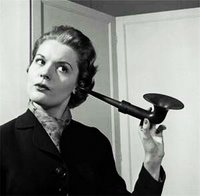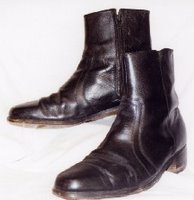
Sometimes - more often than is medically advisable - words fail me. According to the
Sunday Herald, Scotland's Centre for Confidence and Wellbeing has just celebrated a year of existence with an initiative in which "Scottish celebrities and thinkers" are being enlisted "in a bid to create happiness where it's most needed".
Now, even if we accept that the work of a fine institution has been reduced to a cartoon for the purposes of making sure that the intellect of newspaper readers is not stimulated, this is quite awful news on several levels.
Firstly, whenever I hear tell of the word "celebrity" being attached to the word "Scottish", I reach for my spud gun. It is one of this country's finest qualities that it has no celebrities, with the possible exception of "Wee Jimmy Krankie". There is Sir Sean Connery, of course, but he is more of an abstract ideal than a creature of flesh and blood. He is well-known, but his celebrity really belongs to Commander Ian Fleming's 007. Otherwise, Mr Connery would be famous for playing Irish policemen with slurred diction, and for issuing political advice to his homeland from the golf courses of Barbuda.
The directory of Scottish celebrity consists of animals, mostly; from the Loch Ness Monster to Dolly the Sheep, via Greyfriars Bobby. I have not yet managed to see the latest cinematic interpretation of Bobby's life, but I have always thought it appropriate that one of our national myths should be based on a dog which stood vigil around it's master's grave. If there is a more precise definition of the condition of Scottishness, I have yet to discover it.
But I digress. After a year, what has the Centre for Confidence and Wellbeing Achieved? Well, according to its national report, the centre was mentioned in "at least 22 newspaper articles", which is something. You may have noticed, also, a tangible increase in your own confidence and wellbeing, without ever attributing it to the good works of the centre. Next year, apparently, the charity hopes to have an impact on Scotland's suicide rate, though it is too early to say in which direction.
Facetiousness aside, I have a suggestion which would have an immediate impact on the nation's sense of wellbeing. The political commentator, Mr Tim Luckhurst - whose use of the pages of the
Scotsman to upbraid Mr Donald Dewar sent the First First Meenister into a blue funk from which he never recovered - has been busy playing Eeyore in the pages of the
Observer. His point is that the Chancellor, Mr Brown, and the First Meenister, Mr McConnell, are rubbish, and that people are - in the words of the new Liberal Democrat MP, Mr Willie Rennie - "fed up with Labour".
This may be so, but it is odd, then, that they were not also fed up with the Liberal Democrats, who share power in Holyrood. The by-election result also suggested that people are fed-up with the Scottish National Party, and with the Conservatives.
In fact, people are just fed up. Whether this is a matter of free will, or a side-effect of the DNA of Scottishness, I am too scunnered to say.
My suggestion for an increase in national wellbeing and confidence? Mr Luckhurst should be strapped to the roof of a kipper lorry and exported to the Tory shires of England, leaving the rest of us to get on with being doomed.










